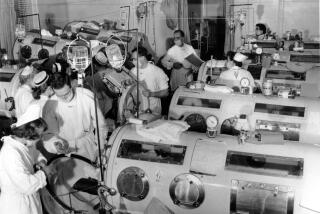Mark Cuban vs. the facts, healthcare edition
As anyone knows who follows the National Basketball Assn., the business world or the reality TV show “Shark Tank,” Dallas Mavericks owner Mark Cuban is brash and outspoken -- and that’s the polite way of putting it.
When it comes to healthcare policy, he’s brash, outspoken and very misinformed.
That became clear on Wednesday, when Cuban advised his 2.8-million followers on Twitter to “have your blood tested for everything available, do it quarterly so you have a baseline of your own personal health.” Recognizing that this involves an enormous expense, he limited the counsel to those who “can afford” it.
For the vast majority of individuals, this is terrible advice, brainless and even dangerous. As a matter of public policy, it’s egregiously misconceived. Cuban’s followers were told so right off the bat by healthcare journalist Charles Ornstein of ProPublica (a former colleague of ours at The Times), who counter-tweeted: “Please don’t listen to @mcuban advice to get quarterly bloodwork if you are healthy.”
Before the exchange played out several hours later, medical experts had weighed in from all over the world. Overwhelmingly they landed on the side of less testing, not more, often citing solid scientific studies of how excessive testing and screening leads to excessive and unnecessary treatment. Ornstein offered to debate Cuban in a ProPublica podcast, but Cuban declined. It’s safe to say he wasn’t swayed by the discussion, since he more or less doubled down on his advice in subsequent tweets.
Cuban’s view is that all data is good, so the more data, the better. That may be true for investors, who typically want to snarf up all the information they can gather about a company and the market it serves, but in medicine things aren’t so simple.
First, people presume incorrectly that medical tests are invariably clear indicators of what the tester is looking for -- you either have something bad or you don’t, and the test will deliver a thumbs-up or thumbs-down.
But as Aaron Carroll explains, “when you get a blood test, it doesn’t come back ‘sick’ or ‘well.’ It comes back with a number value.” The number has to be interpreted, say by comparing it to a population average, or by viewing it in the context of the patient’s existing symptoms. Even a clear trend over time could be innocuous or meaningless.
Medical screening, however, often isn’t innocuous. Tests themselves can carry risks -- a CT scan doses the patient with radiation and a colonoscopy can leave physical damage. The risk of a false positive -- an indication of a problem that isn’t there -- is often greater than the risk of a false negative -- not finding a marker of a condition that does exist.
These are some of the reasons experts have consistently been reducing their frequency recommendations for screenings that used to be advised almost annually, including mammograms, colonoscopies and PSA tests for prostate cancer.
Ornstein cites the work of Dr. H. Gilbert Welch of Dartmouth, an expert on overdiagnosis. In an appearance on NPR in 2011, Welch explained the overuse of the PSA blood test: “Twenty years ago, a simple blood test was introduced. And 20 years later, over one million Americans have been treated for a cancer that was never going to bother them.... It turned out an awful lot of men had abnormal PSAs. Most of these men were treated with either radical surgery or radiation. And roughly a third suffered side effects of treatment generally related to bowel, bladder or sexual function. Even a few have died from it.”
(See the accompanying graphic from the Berlin-based Harding Center for Risk Literacy displaying the risk of unnecessary false alarms, and unacceptably high rates of unnecessary treatment and surgery.)
Cuban displays an endearingly naive view of how medical data is used, and as a billionaire a limited sensitivity to the cost of screening. He’s really talking about the creation of a real-time medical profile, to be accessed by doctors if and when they have reason to do so. At that point, they’ll have a longitudinal database of Cuban’s bloodwork.
As to why that might have any value in his personal case, he hasn’t a clue; if a doctor has a reason to order a specific test of Patient Cuban, he or she is likely to gain vastly more valuable information from that specific test, ordered for a specific purpose than from decades of quarterly tests of dozens, even hundreds, of random indicators at a cost of tens of thousands of dollars.
In one tweet, Cuban writes: “a big failing of medicine = we wait till we are sick to have our blood tested and compare the results to ‘comparable demographics.’”
No, that’s not a “failing” -- that’s the right approach. As an element of public health policy, having our blood tested for nothing in particular or everything under the sun would be unimaginably wasteful and costly and invite billions of dollars in unnecessary treatment. You want to know why Americans spend so much more of its gross domestic product on healthcare than most other developed nations? It’s because we already have too many tests and too aggressive a response to the results they deliver.
In short, the Mark Cuban method is one that would make sense only to a billionaire, and a billionaire with no understanding of health and healthcare. As a public intellectual, moreover, Cuban isn’t especially open to professional advice or hard information. His attitude is that he didn’t get where he is today by listening to criticism. But then again, he’s a businessman and billionaire entrepreneur, not a doctor.
Keep up to date with the Economy Hub. Follow @hiltzikm on Twitter, see our Facebook page, or email mhiltzik@latimes.com.







